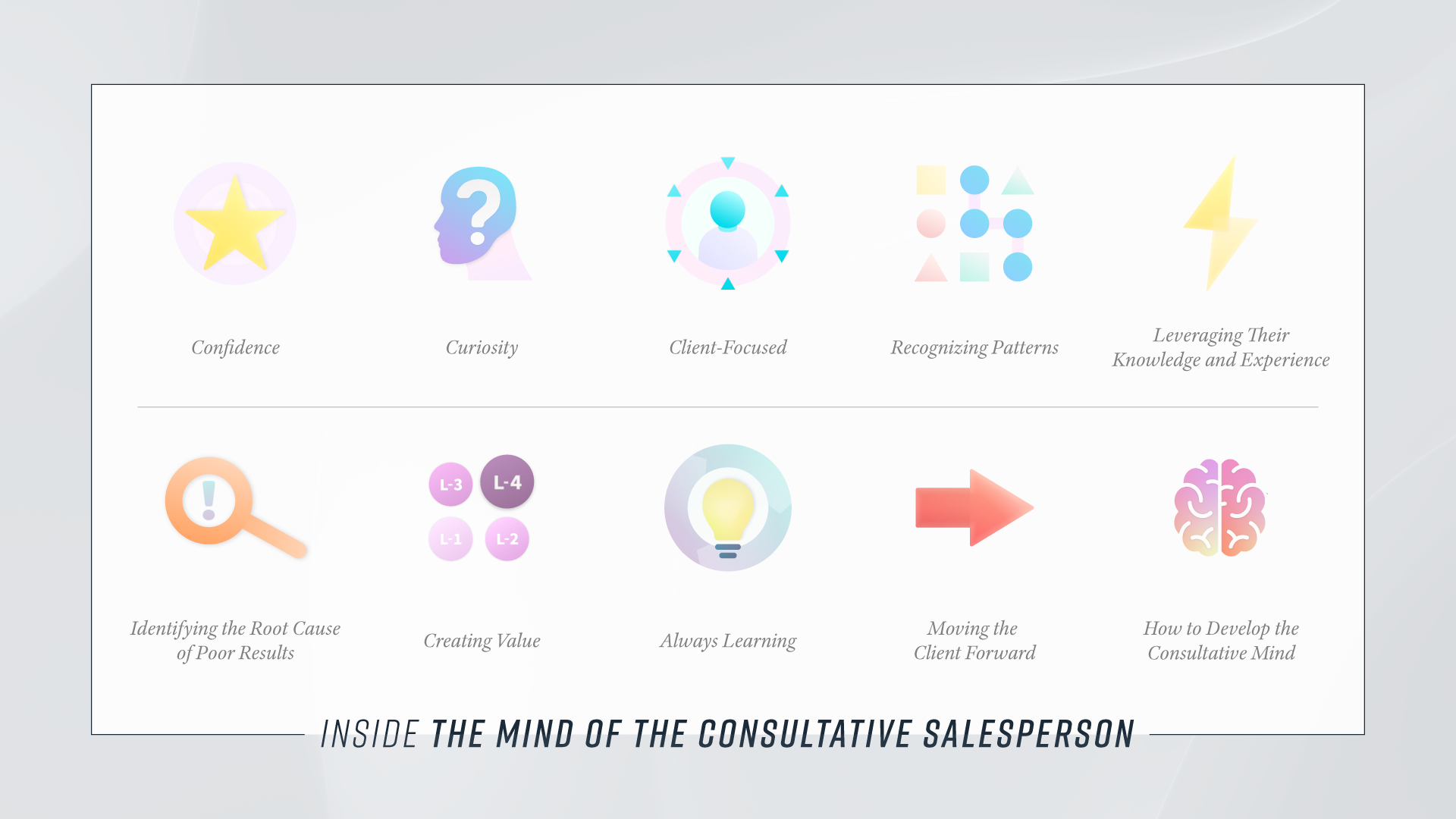Great consultative salespeople have many attributes that help them guide their decisions and interactions with prospective clients. Many good or average salespeople lack these important sales attributes. Great salespeople not only use a consultative selling approach, but they also lead the conversation with a prospect. These are the attributes and related behaviors that set them apart:

Confidence
The first thing you’ll notice about a consultative salesperson is that they are confident. They are confident that the conversation will go well and that their contacts will be engaged. The consultative mind steps into any room feeling confident in their ability to succeed with the buyers and decision-makers.
When you are new to sales, it can take time for you to develop a high level of confidence. Don’t worry too much about this now, as this attribute only shows up as you gain experience interacting with clients. Just try to do good work and focus on the sales process.
Curiosity
Even though the consultative salesperson has deep knowledge and business acumen, they are curious. They are interested to learn about their potential client, their business, and how their common problems differ from other clients.
They ask several open-ended questions and are actively listening to their contacts’ responses. The consultative mindset is eager to pick up on what isn’t being said and who is not saying it. Great consultative salespeople are also curious about the different stakeholders’ perceptions of their challenges. They ask questions that elicit information that average salespeople won’t explore, including nuances that can make a big difference in closing and servicing a sale.
If you are not naturally curious, you might focus on trying to deepen your understanding by asking follow-up questions. This can help you learn a lot from your clients and help you with your sales education. As you pay attention to their responses, you’ll figure out what kinds of questions help are most revealing. It might be those you don’t expect.
Client Focus
Unlike more transactional salespeople, consultative sales professionals are client-centric. They don’t need slides, sales crutches, or superficial rapport building to warm up. Instead, they use their potential customer’s time thoughtfully by focusing on the client’s desired strategic outcome.
This consultative sales approach provides a sales conversation that creates a sense of certainty for buyers. Unlike the average salesperson, who rushes to describe their offering, the consultative salesperson is patient. It will take some time for them to provide a tailored solution. The consultative selling process creates a long-term client; it doesn’t simply fill an order. If you are focused on winning the client’s orders, you are not focusing on their needs. Hold off on conversations about your product or service until it is time to talk about your offerings. This is often later than you think.
Pattern Recognition
The consultative salesperson has enough experience to recognize certain patterns. This makes it easy for the consultative mind to recognize the root cause of a company’s challenges. This pattern recognition also helps great salespeople ask questions that can educate their contacts.
The successful salesperson can see what is invisible to average salespeople. For example, a consultative sales rep can also recognize the readiness of the stakeholders to make the change. This pattern recognition often picks up the internal politics at the prospective company in short order, with little needing to be said.
Application of Knowledge and Experience
A large part of the consultative salesperson’s mind seeks to apply their knowledge and experience. After selling for a significant time, the salesperson’s business acumen allows them to be consultative. As the salesperson works with more and more clients, they gain more and more business acumen.
It is impossible for a salesperson to be consultative while lacking business acumen. You can read books, magazines, and business blogs to help you identify new concepts and educate yourself. Coupling your studies with the experience you are getting while selling will eventually take root.
An Understanding of the Root Causes of Poor Results
An average salesperson asks questions about their prospective client’s problems and their pain points. The consultative is well-informed about problems and implications. Their mind looks past these superficial inquiries and moves to the root cause, knowing that improving the client’s results will mean addressing the source of the problem.
If you fail after selling your client a solution, you didn’t identify and address the real problem. It takes time to uncover what prevents your clients from improving their outcomes.
Value Creation
The consultative salesperson creates value for their clients in every interaction by sharing their experience. This transfer enables the client to make a good decision and move toward the better results they need. The consultative mindset also advises and makes recommendations all along the buyer’s journey.
It is impossible to be consultative without creating value and leading your client. You do this with your counsel, advice, and recommendations. This takes time to master.
Continuous Learning
Although the consultative salesperson knows a lot, they learn from every interaction and all the clients they have helped. This continuous learning is what makes successful salespeople, especially when supported by effective consultative sales coaching. Keeping a journal can help you process your experiences and apply them to future deals.
If you are not already possessed by the consultative mind, the most important initiative is learning. Every consultative salesperson had to learn to be consultative.
Ability to Move the Client Forward
Great salespeople are always looking forward, moving their clients toward the better results they need. The consultative mind defines success as generating better results on behalf of their clients.
The one-and-done salesperson who writes the order, takes the check, and disappears is not, and may never be, consultative.
How to Develop the Consultative Mind
It takes time and effort to develop a consultative mind and the attributes that support it, often guided by insightful consultative sales coaching. The development of these attributes occurs slowly and may go unnoticed. At some point, all at once, you recognize you are selling differently and succeeding more often.
For leaders with sales teams, you should look for ways to cultivate these attributes in the salespeople you hire. You must also enable these attributes in your existing sales force. The effort you exert training, developing, and coaching your sales force will pay dividends for you, and it will improve retention. If you need help, go here: solve for sales.












